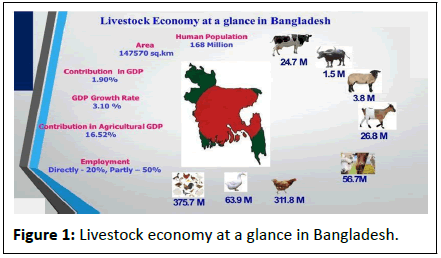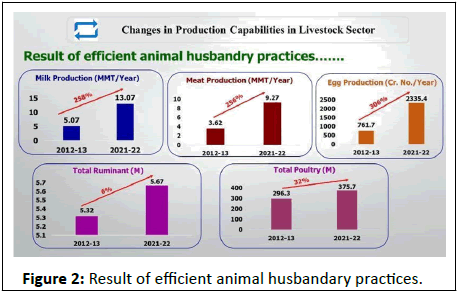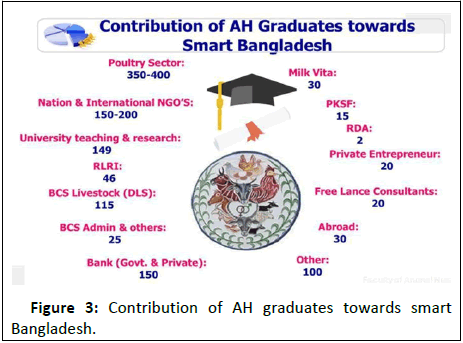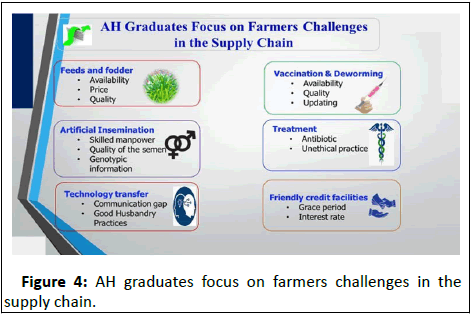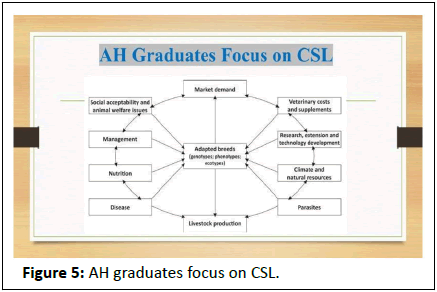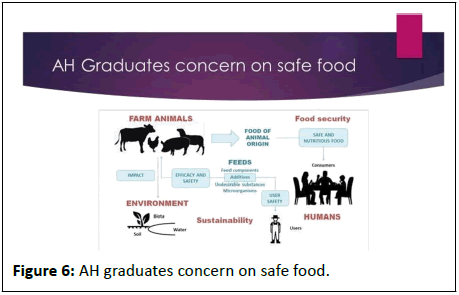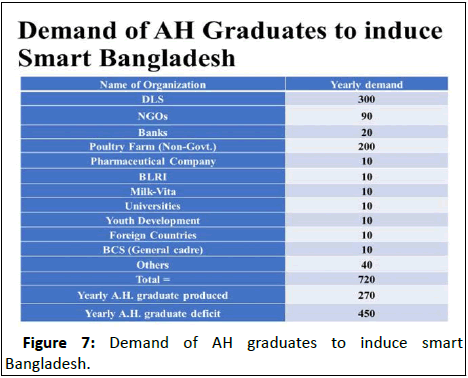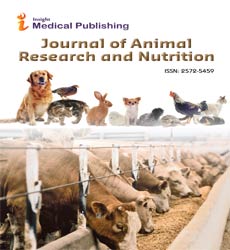Roles of AH Graduates in Establishing 'Smart Bangladesh'
Fahad Hossain Fahim*
Department of Science, Bangladesh Agricultural University, Rajshahi, Bangladesh
- *Corresponding Author:
- Fahad Hossain Fahim
Department of Science, Bangladesh Agricultural University, Rajshahi, Bangladesh
Tel: 8801890921916
E-mail: fahadhosenbau@gmail.com
Received date: April 24, 2023, Manuscript No. IPJARN-23-16494; Editor assigned date: April 26, 2023, PreQC No. IPJARN-23-16494 (PQ); Reviewed date: May 10, 2023, QC No. IPJARN-23-16494; Revised date: June 26, 2023, Manuscript No. IPJARN-23-16494 (R); Published date: July 03, 2023, DOI: 10.36648/2572-5459.8.5.097
Citation: Fahim FH (2023) Roles of AH Graduates in Establishing ‘Smart Bangladesh.’ J Anim Res Nutr Vol:8 No:5
Abstract
AH graduates in Bangladesh have to study 192 course credits (PSTU, 180 credits) including 135 credits on animal production and 19 credits on animal health. Thus, they can mitigate food security hazards in livestock and poultry sectors as well as animal origin food security and animal welfare. In 1899 the association of American agricultural colleges and experiment stations considered that animal husbandry course (zootechny) is four years course. AH graduates have the potential to overcome the challenges of 2041 to 180 million population. Faculty of animal husbandry, BAU is the premier seat of higher agricultural education and research in Bangladesh. Its scholastic activities cover all the domains of agricultural sciences having direct bearing on terrestrial and livestock productivity. Roles, AH graduates can play are analyzed in this paper.
Keywords
Animal husbandry; Graduates; Livestock; Agriculture; Economy; Smart farming
Introduction
Animal husbandry has the potential to overcome the challenges of 2041 to feed 180 million people [1]. Animal husbandry is defined as a science as well as an art of management including scientific feeding, breeding, housing, health care of common domestic animals aiming for maximum returns. As animal husbandry is a pragmatic agribusiness oriented subject, AH graduates have crucial scopes to induce smart Bangladesh by ensuring safe food production, nutritional security and livelihood improvement. Forth with, a person in Bangladesh consumes 147.84 gram of meat, 208.16 ml of milk per day, which is endued by the AH graduates [2]. Almost 20 percent of the Bangladesh's population is directly and 50 percent of the population is indirectly dependent on livestock sector. That's why AH graduates are the wonder tonic of establishing ‘smart Bangladesh’ (Figures 1 and 2).
Figure 2: Determination of retention time.
Smart Bangladesh refers to cost effective, sustainable, intelligent, knowledge based and innovative technological Bangladesh (Figure 3) [3]. Built on the four pillars of smart citizens, smart government, smart economy and smart society, it is about bridging the digital divide by innovating and scaling sustainable digital solutions that all citizens, regardless of their socio economic background, all businesses, regardless of their size, can benefit from [4]. From production to marketing, subsistence to commercial agriculture, development to sustainability, AH graduates have strategic plan to transform the economy to reach high income country status by 2041 and achieve the sustainable development goals along the way including:
• By supplying KPI (milk, meat, egg) of livestock sector to build robust and smart nation.
• By creating demand for goods produced in both commercial and rural people on the strength of the purchasing power to build smart society.
• By providing investable surplus in the form of savings and taxes to be invested in both agricultural and non-agricultural sector to build smart economy.
• By earning valuable foreign exchange through the export of agricultural products to smart economy.
• Providing employment to a vast army of uneducated, backward and unskilled labor through entrepreneurship and training.
• By creating smart livestock infrastructure through research projects, academic knowledge and smart management practices.
• Responsible leadership for smart government.
• Economic empowerment of women for smart Bangladesh.
Description
AH graduates have to study 192 course credits including 135 credits on animal production and 19 credits on animal health. Thus, they can mitigate food security hazards in livestock and poultry sectors as well as animal origin food security and animal.
Welfare, in 1899 the association of American agricultural colleges and experiment stations considered that animal husbandry course (zootechny) is four years course [5]. AH graduates in Bangladesh and all over the world has established to cater animal protein the vital needs of mankind as well as for providing professional manpower as teachers, researchers, scientists, extension personnel for livestock and poultry (GO) and business entrepreneur including:
Adopting agriculture 4.0 with smart farming: Internet, computer, smartphones, AI, blockchain, IoT and other relevant technologies are getting more affordable with time. AH graduates are initiating information tech, mechanization, market linkages, access to finance and advanced farming techniques to adopt agriculture 4.0, which offers much greater efficiency and production potential, as a recent Chinese experiment has shown. More than 300 of AH graduates in Bangladesh are operating in these market spaces with innovative solutions (Figure 4).
Promoting climate smart livestock production system: AH graduates are initiating climate smart livestock production system by:
• Sustainably increasing agricultural productivity and incomes.
• Adapting and building resilience to climate change.
• Mitigating global warm and greenhouse effects (Figure 5).
Food security in new action plan amid global crisis: In FY 2021-22, about 131 lakh metric tons of milk, about 93 lakh metric tons of meat and more than 2335 million eggs were produced in Bangladesh which were directly or indirectly supervised by AH graduates. Besides, from FY 2017-18 to FY 2020-21, it was possible to meet the demand for sacri icial animals during Eid-ul-Azha only through domestically produced cattle (Figure 6).
Bridging the SDGs to smart Bangladesh: AH graduates will localize SDG by:
• Marketing and infrastructure development.
• Collaboration between academic institute and industries.
• Strengthening quality control activities.
• Training for small holding farmers and technicians.
• ‘NO’ Import of Livestock and poultry products.
• Popularization of buffalo.
• Achieving seven goals that are related with livestock (No poverty, zero hunger, good health and well-being, gender equality, decent work and economic growth, responsible consumption and production, climate action).
Contribution to local and national economy: AH graduates can contribute a lot from local to national economy through professional activism: Poultry development officer, livestock development officer, district livestock officer, project development officer, Scientific officer of BLRI, IDRN, LDDP, animal nutritionist, zoo officer, consultants, livestock extension officer through:
• Helpful in phasing out economic depression.
• Contribution to capital formation.
• Employment opportunities for rural people.
• Improving rural welfare.
• Extension of market for industrial output.
• Pre-requisite for raw material.
• Improving the exchange rate of agricultural exports (Figure 7).
Research strategies to responsible leadership: AH graduates research goal is focused on activities related to breeding, nutrition care and management of various types of farm animals and poultry for the efficient and profitable livestock production. Combining responsible leadership with smart farming may increase the bonding and trust relationships among farmer and their support providers for a higher level of agro based income [6]. Besides, AH faculty of BAU has been the principal supplier of skilled world class animal scientists like Dr. Shubash Chandra Das (Most valuable person of the Year 2022 for livestock development), A. Hashem, PhD (President of Bangladesh meat science association), Dr. Mohammad Moniruzzaman (reproductive biotechnologist), Dr. Mohammad Ashiqul Islam (dairy scientist). From Fairchild dairy teaching and research center to ministry of fisheries and livestock of Bangladesh (Dr. Nahid Rashid, secretary to the government of Bangladesh) AH graduates are serving and will serve to build Bangladesh a smart country.
Conclusion
Finally, from the above explanation; I would like to conclude that AH graduates are the trump card of building smart agriculture, smart nation, smart economy, smart citizen, smart government. Dr. Norman Ernest Borlaug once said, “You can't build a peaceful world on empty stomachs and human misery.” AH graduates are the magicians who produce money from the mud. Magic is happening in our livestock sector. MK Gandhi always states; “The greatness of a nation and its moral progress can be judged by the way its animals are treated.” Bangabandhu Sheikh Mujibur Rahman said, “In agriculture, animal husbandry to poultry all aspects should be looked at, should proceed in planned way.” We need more AH graduates to induce smart Bangladesh. Animal husbandry education acts as a catalyst of social change; New progressive ideas towards life occurs. A new class of entrepreneurs and leaders is born, capital formation and export increases, technical innovations take place. All these changes produce a favorable impact on social relationship which, in fact, acts as a precursor of a new, modem, cultured smart Bangladesh.
References
- Ah-Lian K, Eric R, Karl A, Jari P, Georges JP (2019) Education in green ICT and control of smart systems: A first hand experience from the international PERCCOM masters programme. IFAC-Pap 52:1-8
- Haque A, Islam N, Samrat NH, Dey S, Ray B (2021) Smart farming through responsible leadership in Bangladesh: Possibilities, opportunities and beyond. Sustainability 13:4511
- Nye BD (2015) Intelligent tutoring systems by and for the developing world: A review of trends and approaches for educational technology in a global context. Int J Artif Intell Educ 25:177-203
- Mahmood SS, Rasheed S, Chowdhury AH, Hossain A, Selim MA, et al. (2020) Feasibility, acceptability and initial outcome of implementing community scorecard to monitor community level public health facilities: Experience from rural Bangladesh. Int J Equity Health 19:1-1
[Crossref] [Google Scholar] [PubMed]
- Rahman M, Kamal MM, Aydin E, Haque AU (2022) Impact of Industry 4.0 drivers on the performance of the service sector: Comparative study of cargo logistic firms in developed and developing regions. Prod Plan Control 33:228-243
- Ahmed N, Chowdhury AM, Urmi T, Jamal L (2023) Impact of socio-economic factors on female students’ enrollments in science, technology, engineering and mathematics and workplace challenges in Bangladesh. Am Behav Sci 67:1104-1121

Open Access Journals
- Aquaculture & Veterinary Science
- Chemistry & Chemical Sciences
- Clinical Sciences
- Engineering
- General Science
- Genetics & Molecular Biology
- Health Care & Nursing
- Immunology & Microbiology
- Materials Science
- Mathematics & Physics
- Medical Sciences
- Neurology & Psychiatry
- Oncology & Cancer Science
- Pharmaceutical Sciences
